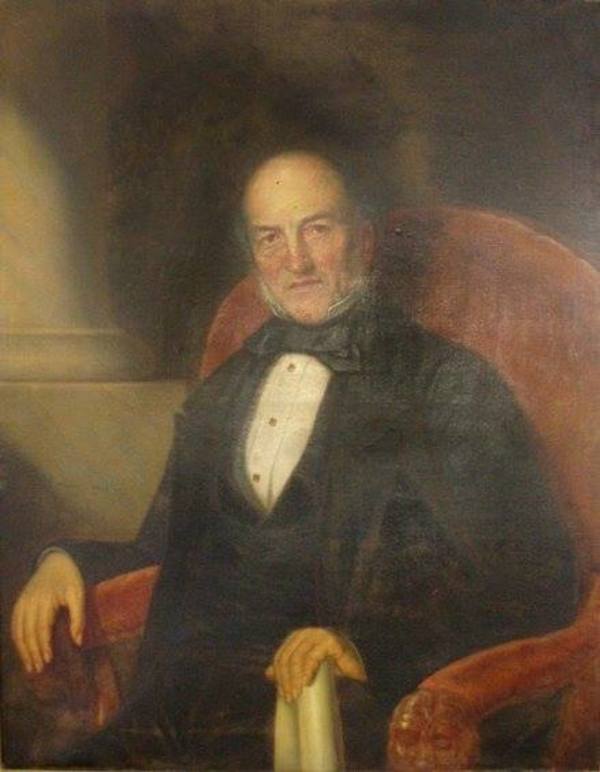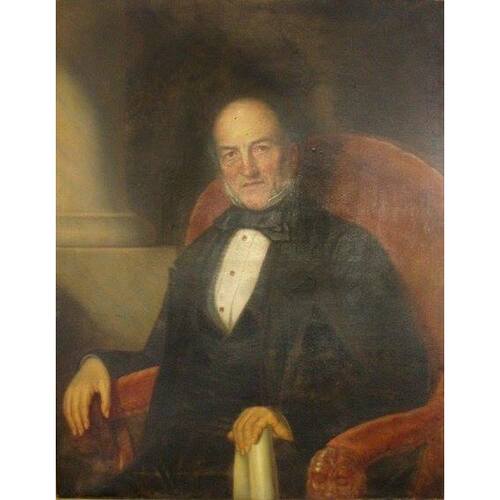
Source: Courtesy of Wikimedia Commons
MORRIN, JOSEPH, doctor; b. 19 Oct. 1794 in Dumfriesshire, Scotland; m. 18 Jan. 1817, at Quebec, Catherine Evans, and they had six children; d. 24 Aug. 1861 at Quebec.
Joseph Morrin was four years old when he arrived at Quebec with his parents. He received primary and secondary education at the school run by the Reverend Daniel Wilkie*. His parents intended him to take up engineering, and consequently considered it pointless for him to continue his studies. Hence, apparently in 1809, the youth was entrusted to the care of a tradesman who was to give him some basic training. However, Morrin almost immediately became an apprentice of surgeon James Cockburn, who had been established at Quebec for some years, and was one of its few pharmacists. Morrin soon learned how to prepare medicaments, mastered the art of applying poultices, and assisted Cockburn with his operations. At the same time, he resumed studies at Wilkie’s night school.
At this period, the city of Quebec had neither a medical school nor teaching hospitals. Anatomical dissection could be practised only on the corpses of common law criminals. Cockburn, with numerous patients at Quebec and in neighbouring villages, had established a hospital in lower town for sailors and victims of shipboard accidents. Consequently a pupil like Joseph Morrin found a great many advantages in working under Cockburn which students elsewhere did not enjoy since the latter had their courses read to them by their employers, and learned anatomical dissection by means of printed plates and drawings.
Because military doctors were scarce at Quebec, Morrin, despite his youth, was considered sufficiently competent by the military authorities to accompany soldiers disabled in the War of 1812 to Portsmouth, England. He went to London and without delay became a student at London Hospital, then under the direction of one of the ablest surgeons in England, Sir William Blizard. Morrin also studied for a short while in Edinburgh, but he failed the examinations of the Royal College of Surgeons. In fact he had not been able to complete the programme of study and the period of internship required for a diploma.
Morrin returned to Canada in 1814 and shortly after was appointed temporary assistant naval surgeon on the Great Lakes. He gave up this post a few months later and became assistant to his former employer James Cockburn, at Quebec. Licensed to practise medicine on 15 July 1815, Dr Morrin, in 1818 or 1819, set up his office in lower town and founded a sailors’ hospital. As his practice grew he went into partnership with John Musson, then the senior chemist and pharmacist in Lower Canada, and settled in upper town.
Thanks to his talent and his interest in the community’s welfare, Dr Morrin soon became an eminent member of the medical profession in the Quebec region. For many years after 1826, he was on the medical staff of the Hôtel-Dieu of Quebec. In 1826 he also took an active part in founding the Société Médicale de Québec of which he became the first president. He was a regular contributor to the Journal de Médecine de Québec, which had been started in 1826 by François-Xavier Tessier*. In 1830 he helped found the Marine Hospital, which was set up to combat epidemics but was not opened until 1834; he worked there with doctors James Douglas*, Joseph Painchaud*, and Anthony von Iffland*.
During the cholera epidemics of 1832 and 1834 Dr Morrin gave generously of his energy as a commissioner of the Quebec Board of Health. In 1847, when he was president of the commissioners of the Marine and Emigrant Hospital, he was just as unsparing and zealous in his efforts.
Morrin took part in the movement launched by a number of progressive doctors to establish a college of physicians and surgeons. This movement, supported by Painchaud, Daniel Arnoldi*, Wolfred Nelson, and others, led to the incorporation in 1847 of the College of Physicians and Surgeons of Lower Canada. The name of Morrin also was on the list of founders of the École de Médecine de Québec, which opened its doors in 1848 and became part of the medical faculty of Université Laval in 1852. Morrin was its first president. In 1849 he was a director of the asylum at Beauport, which he, James Douglas, and Charles-Jacques Frémont had founded in 1845. He was also the doctor for the Quebec prison.
Anxious to render service and devote himself to the economic and social progress of his fellow citizens, he naturally became active in municipal politics. From 1836 on, Morrin participated in Quebec political life as justice of the peace responsible for the administration of the city [see Hippolyte Dubord*]. From 1840 to 1842, and from 1850 to 1854, he was alderman of Palais district, and in February 1855 was elected mayor, for a one-year term, by the members of the council. He held this post again from 1857 to 1858, becoming at that time the first mayor elected by the “qualified electors . . . duly competent to elect the members of the council,” in conformity with the law of 19 June 1856.
During his first term as mayor, Morrin led the demonstrations marking the visit to Quebec of La Capricieuse in 1855 [see Paul-Henry de Belvèze*]. He endeavoured to obtain regular ship connections between Quebec and Great Britain, and to persuade the imperial government, to no avail, to recognize Quebec’s claim to be permanent capital of Canada. Indeed the minutes of the council of 14 Sept. 1855 indicate that George-Étienne Cartier* even wrote to him that no “branch of the secretariat of the Department of Crown Lands [could] be left at Quebec at the time of the transfer of the seat of government” from Quebec to Toronto. Under Morrin, the city of Quebec reorganized its police services, and improved its street lighting and most of its administrative services. Mayor Morrin’s most effective associate at that time was the clerk of court, historian François-Xavier Garneau.
During his second term, Morrin once more insisted on “Quebec’s claims to become the capital of Canada.” But the efforts of the mayor and his council yielded no better results. Still defending his city’s rights, Morrin complained when the governor of Canada, returning from Great Britain to Toronto, failed to stop at Quebec. Sir Edmund Walker Head apologized, giving as a pretext his wife’s poor health. Elections in Quebec at this time being scarcely untroubled events, the town council passed a regulation ensuring “the maintenance of peace during an electoral period.” The Rue Saint-Jean was widened, and the mayor endeavoured to protect Quebec’s interests during the negotiations regarding railway building on the north shore.
As president of the St Andrew’s Society of Quebec, Morrin was one of its most loyal supporters for some 30 years. His medical knowledge, extensive for his day, his competence, and his untiring devotion to duty earned him such authority and respect that he had few professional rivals.
Joseph Morrin’s name is still well known in Quebec. It designates a building, Morrin College, which since June 1868 has housed the oldest historical and literary society in the British empire (Great Britain excepted), the Literary and Historical Society of Quebec, founded on 6 Jan. 1824. Opened in 1862 thanks to a substantial financial contribution made by the doctor, Morrin College existed as a Protestant institution until 1902. Morrin also gave his name to a prize awarded each year by Université Laval, and conferred for the first time on 24 May 1859. It consisted of a sum of £500 bequeathed to the faculty of medicine to allocate according to its own terms and conditions.
ANQ-Q, État civil, Presbytériens, St Andrews (Quebec), 18 Jan. 1817, 24 Aug. 1861. ASQ, Université, 101-BG; 103-BA. AVQ, Procès-verbaux du conseil, 1854–58. Can., prov. du, Statuts, 1847, c.26; 1856, c.69. Morning Chronicle (Quebec), 2 Sept. 1861. Quebec Gazette, 26 Oct. 1864. Université Laval, Annuaire, 1868–69, 16. Abbott, History of medicine. M.-J. et George Ahern, Notes pour servir à l’histoire de la médecine dans le Bas-Canada, depuis la fondation de Québec jusqu’au commencement du XIXe siècle (Québec, 1923), 420–23. C.-M. Boissonnault, Histoire de la faculté de médecine de Laval (Québec, 1953), 139–41. Heagerty, Four centuries of medical history in Can., I, 86. W. P. Percival, The lure of Quebec (Toronto, 1941), 112, 141. C.-M. Boissonnault, “Création de deux écoles de médecine au Québec,” Laval médical (Québec), 39 (1968), 547–49. C.-A. Gauthier, “Histoire de la Société médicale de Québec,” Laval médical, 8 (1943), 62–121. Sylvio Leblond, “L’hôpital de la Marine de Québec,” L’Union médicale du Canada (Montréal), LXXX (1951), 616–26.
Cite This Article
Charles-Marie Boissonnault, “MORRIN, JOSEPH,” in Dictionary of Canadian Biography, vol. 9, University of Toronto/Université Laval, 2003–, accessed December 21, 2025, https://www.biographi.ca/en/bio/morrin_joseph_9E.html.
The citation above shows the format for footnotes and endnotes according to the Chicago manual of style (16th edition). Information to be used in other citation formats:
| Permalink: | https://www.biographi.ca/en/bio/morrin_joseph_9E.html |
| Author of Article: | Charles-Marie Boissonnault |
| Title of Article: | MORRIN, JOSEPH |
| Publication Name: | Dictionary of Canadian Biography, vol. 9 |
| Publisher: | University of Toronto/Université Laval |
| Year of publication: | 1976 |
| Year of revision: | 1976 |
| Access Date: | December 21, 2025 |



